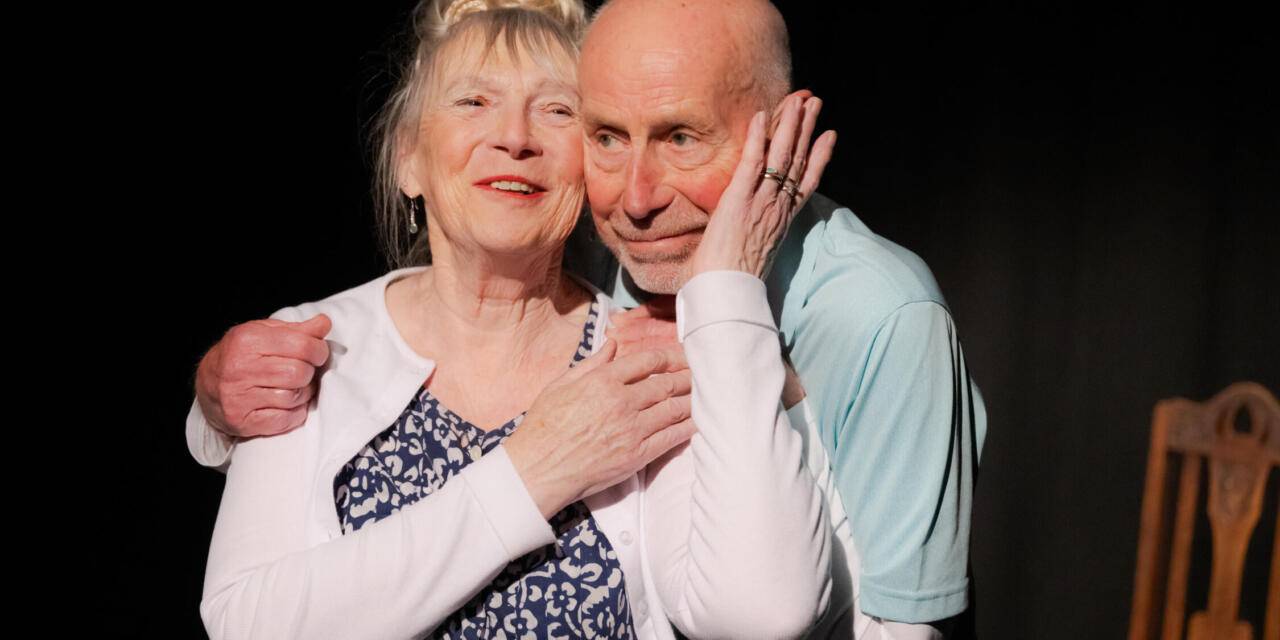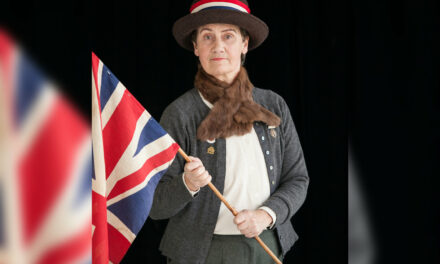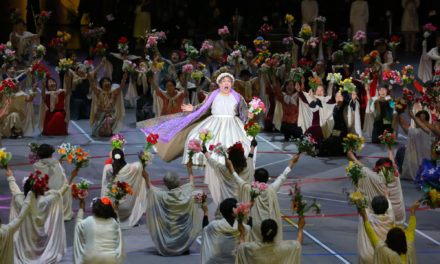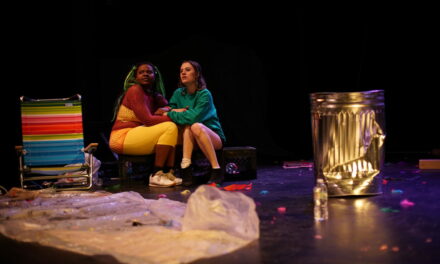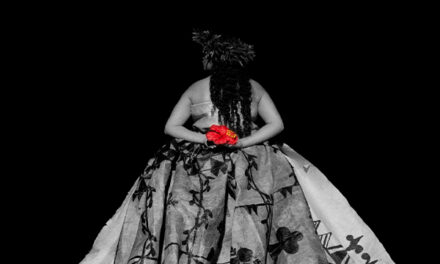In a year in which 77-year-old Dolly Parton recorded her first rock record, the octogenarian Rolling Stones released their first original album in years and 81-year old Harrison Ford starred in a new Indiana Jones action movie, it’s hardly surprising to see a play that aims to re-define old-fashioned clichés about older persons.
As the lights fade up on Tolis Papazoglou’s minimalist set for The Secret Lives of Extremely Old People, the black-suited stage manager Eric Gardiner peels back stage blacks to reveal another set of velvet curtains in lush theatrical red. This eloquent reveal is a fitting opening to a show that wants us to look beyond surface appearances and to see the colourful lives of those who’ve clocked up the most kilometres on the odometer of life. Gardiner introduces himself to the audience, and explains that at 81 years old he’s quite possibly the oldest stage manager still working. Not only does this break the convention of the silence and invisibility of the stage manager, it highlights the mission of this play to subvert stereotypes about ageing.
Playwright Rachel McAlpine, who is the author of more than 30 novels, plays, children’s books, poetry collections, and non-fiction books, defines the show as “theatre against ageism”. Since her doctor informed her at the age of 75 that she could live to 99, she has been on a mission to dispel negative perceptions of ageing. Now aged 83, she says that this revelation transformed her attitude about ageing and the elderly. At first she was angry, because she had only negative thoughts about the ageing process: “It’s very common to look at an old person and to say that’s horrible, I don’t want to be like that.” Since then she has been writing poems, blogs and podcasts that counter-act ageism and present a more optimistic picture of ageing. In 2020 she celebrated her 80th birthday by publishing a book of poetry How to be Old. In 2023 she edited the blog of retired nursing professor Doris Carnevali and published it as The Sturdy Centenarian. McAlpine is a member of Crow’s Feet, a community dance collective for mature women, an experience she describes as “life-changing”. Three years ago McAlpine performed in a revue-style show The Older the Better, produced by Kate Jason-Smith’s iconic Hens Teeth feminist comedy troupe. Every performer in this show was aged over 70, with three performers in their 90s. The performers in The Older the Better were energetic, funny, highly engaging, full of rich and varied stories, and mischievously ironic. Their very presence on stage dispelled any preconceptions about the older persons being infirm or incapacitated, while the diversity of their stories subverted stereotypes of the elderly as a homogenous group.
The Secret Lives of Extremely Old People began as a memoir funded by a Creative New Zealand grant, but transformed into a verbatim play when McAlpine realised “I need to write about other people who know what it’s like to be really old”. In January 2022 she began interviewing as many people as she could over the age of 90. Finding her interviewees through word of mouth, she spoke to thirteen people whose stories are re-told in the play. She found they had notably diverse voices and contrasting points of view, and this very rich material was perfectly suited to theatre.
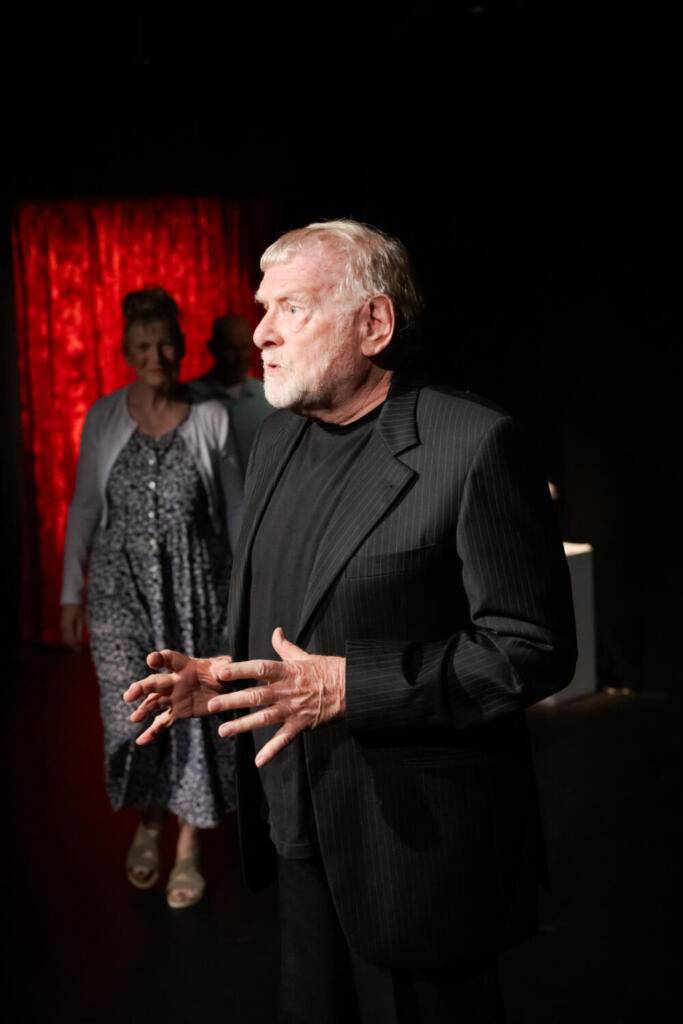
Stage Manager Eric Gardiner as himself in The Secret Lives of Extremely Old People directed by Robin Payne, at Circa Theatre, November 2023. Written by Rachel McAlpine. Photo credit: Stephen A’Court.
In late 2022 McAlpine and director Robin Payne organised a reading with actors in their late 70s. At this stage the play had multiple characters, including Doris Carnevali and an interviewer character, but after the reading, the script radically changed. In the second version, the play had a conventional Aristotelean narrative arc with interrelationships, conflict and dialogue. In May 2023, the scriptwriting agency Playmarket funded a script clinic with younger actors and Playmarket’s director Murray Lynch as dramaturg. During the clinic actors improvised playing themselves at different ages, and discovered that all of them had vibrant relationships with ageing and older people. With Lynch’s input, the script was again re-written. McAlpine and Payne decided the script had become “cluttered” so decided to simplify it, to strip it back to monologues based around thematic structures. The interview material was shaped and edited into what Payne terms a “close work” style. The thirteen interviewees were distilled into five composite characters, and the script became a mosaic of stories. At this stage a funding application was turned down as, in McAlpine’s words, the project “wasn’t sexy for anybody”. Yet she felt an obligation to the people she’d interviewed, a goal to create an audience experience that would raise the level of optimism about old age, and was convinced that there would be an audience for the play. So she persisted, took on the role of producer, secured the venue and some modest funding, and Payne went ahead with casting the play.
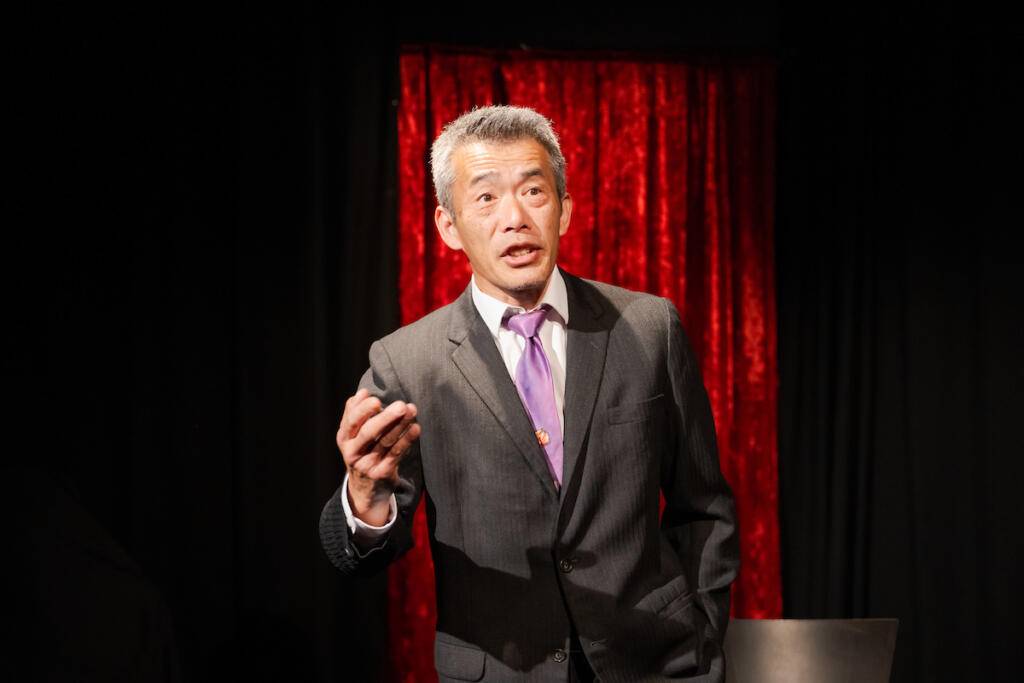
Gary Young as Gilbert in The Secret Lives of Extremely Old People. directed by Robin Payne, at Circa Theatre, November 2023. Written by Rachel McAlpine. Photo credit: Stephen A’Court.
During the development phase, Robin Payne became aware of the serendipity of having older and younger voices around the table, and became attracted to the intergenerational aspect of the project. McAlpine was aware from her experience performing in The Older the Better that the nonagenarian performers were completely exhausted and it wasn’t practical for very elderly actors to perform a full three-week season. As a result, The Secret Lives of Extremely Old People features an “age-diverse” cast, ranging in age from 43 to 81, to illustrate that an elderly person contains within them all the ages they have ever been. Near the beginning of the show, each actor speaks intimately to the audience, introducing themselves and their age as well as their character. 75-year-old Annie Ruth and 81-year old Lloyd Scott have a wonderful rapport as a married couple Peggy and Tom. 57-year-old Gary Young introduces himself in Cantonese and English, explains that his father migrated from Canton in 1955, and that he nursed his father before he died. Dressed elegantly in suit and tie, Young plays Gilbert, a 90 year old Emeritus Professor of Economics, with dignity. The youngest cast member Anna O’Brien (43) plays 94-year-old Zinnia, a musician who plays in a band and delivers meals-on-wheels. Grace Hoete introduces herself in te reo Māori and English. Her character Puti (age 93) is a writer, a “child of the depression” who has learned to deal with hard times and left school at the age of twelve yet ended up teaching in a university.
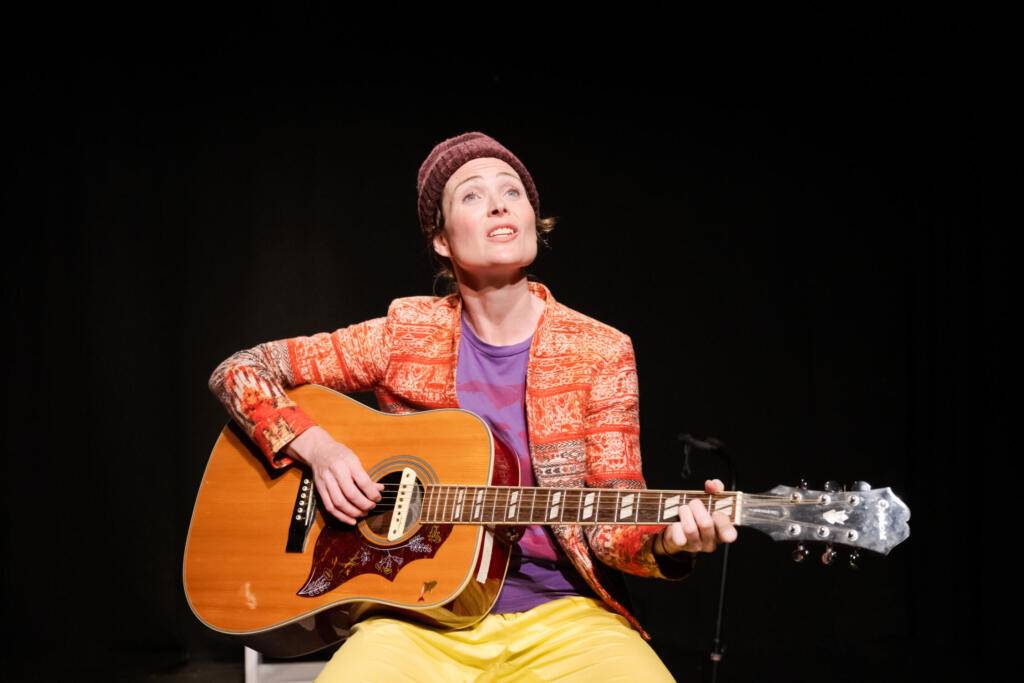
Anna O’Brien as Zinnia in The Secret Lives of Extremely Old People. directed by Robin Payne, at Circa Theatre, November 2023. Written by Rachel McAlpine. Photo credit: Stephen A’Court.
The play illustrates that ageing can be messy, painful and terrifying, yet this balances with the wit and self-deprecating humour of the characters. While they exist in their own worlds without interaction, their stories resonate with each other. Each character’s narrative through-line contains revelations or climaxes that provide drama or comedy. Three of them are cancer survivors, one contemplated suicide as she struggled with her sexuality, all of them have a cocktail of health issues. They make cups of tea and chat to us as though we were in their living rooms. The infectiously optimistic Zinnia says “you’ve got to have hope and joy in your life”, finds love in her 90s and is planning her wedding. Tom is a dab hand at repairing things, and although he and Peggy have been poor in the past they now feel lucky to be living together in an apartment. Tom’s quip about their sex life prompts one of the biggest laughs of the evening. Peggy talks about keeping the brain active and can remember the names of nineteen grandchildren. Gilbert acknowledges that he is “seriously privileged” and ironically calculates the value of his great age in terms of economics: “am I an asset or a liability?” While Gilbert’s reflective musings give hints of the broader social and political changes through his lifetime, Puti recalls her political protests against the Vietnam war and nuclear testing, and the fight for women’s rights. Brought up without awareness of her Māori identity leaves her living as a Pākehā and she didn’t go to a marae until she was fifty, but by the 1970s she is politicised by the fight for Māori land rights. The gentle power of Puti’s story is extremely moving, and when she begins singing the trade union anthem “Bread and Roses”, many in the audience respectfully sing along.
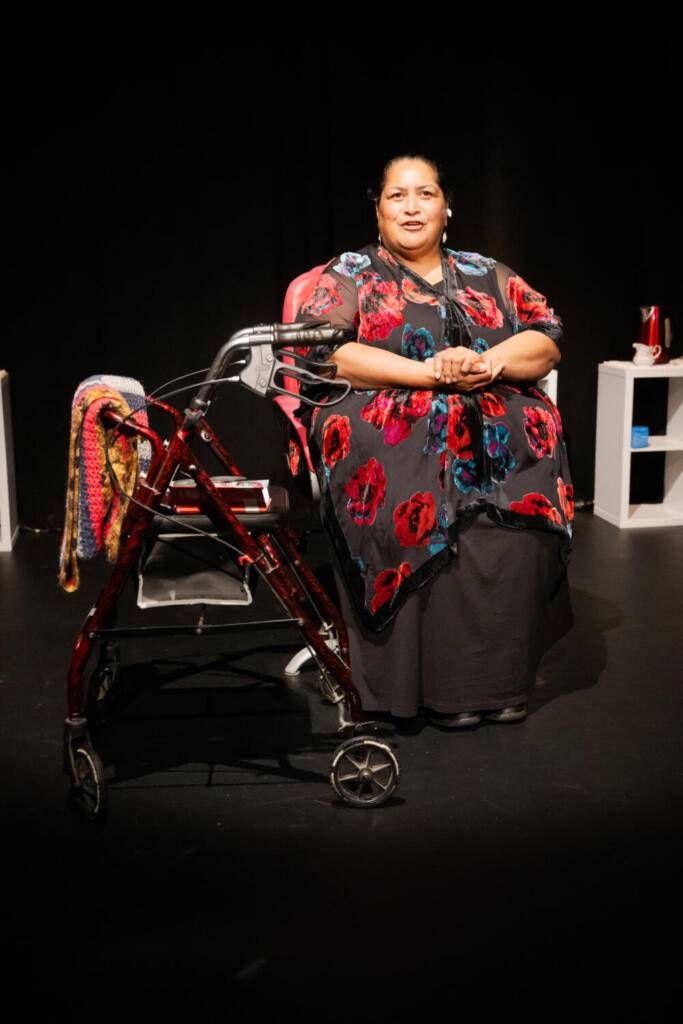
Puti (Grace Hoete) in The Secret Lives of Extremely Old People. directed by Robin Payne, at Circa Theatre, November 2023. Written by Rachel McAlpine. Photo credit: Stephen A’Court.
Late in the play, Peggy’s revelation of a past secret brings a surprising alternative perspective to her long marriage, and there’s just a hint of a more complex subtext beneath Tom’s constant assertion that they are very happy together. The mood of reminiscence reveals pain as well as joy, and some stories evolve into philosophical statements. Puti expresses the major theme of the play with gentle assertiveness: “We want as much control over our lives as possible. We want to be seen as credible.”
The intimacy of Circa’s smaller studio theatre is perfect for this verbatim material and Robin Payne’s direction sensitively draws out the nuances of the characters and stories. On both performances I attended, the audience murmur in recognition with the characters and sing along spontaneously with songs such as “Ain’t we got fun” (accompanied by a snappy dance routine by Lloyd Scott). They applaud as Scott (the oldest cast member at age 81) reveals that he can still ride his bicycle up the (very steep) Ngaio Gorge and give audible responses of approval when he says he wants to die in his own home, not a rest home. The interplay between the actors’ personalities and the character narratives enhances the community atmosphere of the production and deepens its themes.
The production features surprise appearances (via pre-recorded video projection) from esteemed theatre veterans, director Sunny Amey and actors Dame Kate Harcourt and Des Kelly, all aged in their nineties. Each interviewee captivates the audience with their charm and wit. These recordings, along with Eric Gardiner’s cameo, were key to Robin Payne’s directorial concept, complementing the script by incorporating theatrical elders with powerful connections to the Circa studio stage. Kelly reminds us that he and Dame Kate last appeared together in this very same venue in Joe Musaphia’s Ugly Customers (2004) playing elderly bank robbers. There are audible responses of delight from the audience at each guest appearance, with the biggest laughs coming as the interviewees recognise the irony when they lose their train of thought and dry in front of the camera.
Ultimately McAlpine’s faith in her concept was justified – the season of The Secret Lives of Extremely Old People was completely sold out. I saw the play twice and each time the foyer afterwards was buzzing with people of all ages, evidence that McAlpine’s aim that “the audience would go away with a positive feeling about ageing” had been achieved. The foyer display includes a copy of McAlpine’s The Sturdy Centenarian for people to browse through and an invitation to fill out a card and pin it on a board headed “What do you think your life will look like in your 90s?” Most of the responses are in the positive spirit of the play, often channeling its humour. Someone aged 62 writes, “In my 90s I will be doing yoga and drinking champagne with my friends and family.” An 81-year-old has written, “To have love and laughter and gratitude in my life”. Several responses are from children: “I will be COOL”; “Everything would be BORING, but not senior discounts” “Asleep on my hovercraft chair” [with matching illustration]; “I will tell storys to my grankids”. From the intimacy of the performance to the conversations in the foyer, The Secret Lives of Extremely Old People made the most of the live theatrical encounter to create a strong sense of community without age boundaries, and a non-sentimental, playful and life-affirming celebration of the ageing process.
The Secret Lives of Extremely Old People by Rachel McAlpine
Directed by Robin Payne
Designed by Tolis Papazoglou
Circa Theatre, Wellington, New Zealand 25 November – 17 December 2023
This post was written by the author in their personal capacity.The opinions expressed in this article are the author’s own and do not reflect the view of The Theatre Times, their staff or collaborators.
This post was written by David O'Donnell.
The views expressed here belong to the author and do not necessarily reflect our views and opinions.

